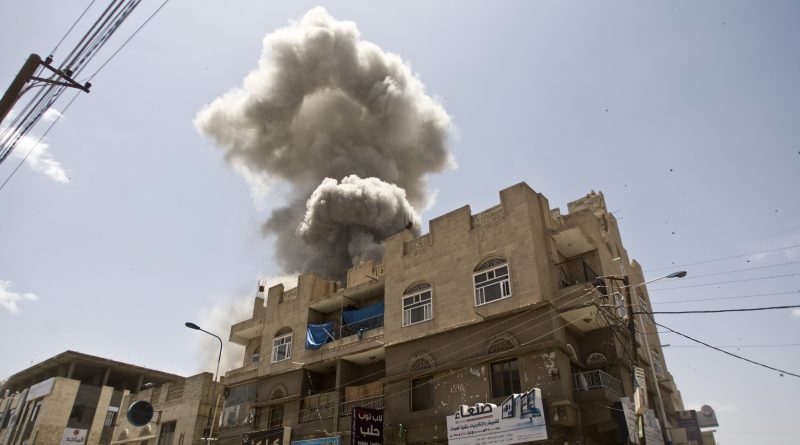Saudi airstrikes bombard Yemen as world media fixates on Khashoggi
By Stephanie Miller
Staff Writer
As the international media speculates over the death of Jamal Khashoggi – a Saudi Journalist who fled to the U.S. for his views on the Saudi royal family – Saudi Arabia continues its airstrikes in Yemen by bombarding a vegetable market in the Hodeidah province, killing 19, reports NBC News.
Reports say that the bodies of victims were damaged so badly that it was not yet possible to determine if those killed were men, women, or children.
Yemeni residents told Reuters that violent clashes erupted in the southern outskirts of Hodeidah, a port city that pro-government forces have been trying to capture from the Houthi rebels since the renewal of an offensive in September.
A Saudi-led coalition entered Yemen’s conflict after the Houthis ousted the internationally recognized government of President Abd-Rabbu Mansour Hadi.
This coalition has conducted frequent airstrikes since 2015, targeting the Iran-aligned Houthi group, says Reuters. The coalition has a record of hitting civilians, although it denies intentionally doing so.
The coalition sometimes admits “errors,” and has previously promised to hold those who cause civilian deaths accountable. Meanwhile, the perpetuation of a war that has taken the lives of over 10,000 has shoved the Arabian Peninsula’s poorest country to the edge of widespread famine.
Last month, the United Nations Office for the Coordination of Humanitarian Affairs said 8 million people were desperately dependent on aid and some 3.5 million more risked joining them.
However, based on new surveys and analyses, the UN concluded that those statistics were generous. As many as 14 million people (half of Yemen’s entire population) are soon to be “entirely reliant on external aid for survival,” said the UN according to Reuters.
NPR reports that more than 17,000 Yemenis have been killed or wounded in the fighting. There were also more than 1 million suspected cases of cholera last year, and currently at least 3 million have been internally displaced by violence.
However, the Yemeni crisis continues to play out in the background of other events that receive greater coverage.
Whereas the body of young Syrian refugee Aylan Kurdi brought Europe’s refugee crisis into focus in 2015, the death of Jamal Khashoggi has sparked international outrage and the proposition of U.S. sanctions. Still, the media has been remarkably silent on the ongoing humanitarian crisis in Yemen.
The New York Times attributes this to a phenomenon known as the “collapse of compassion.” Even if the circumstances are identical, humans generally experience a greater emotional reaction to one death than to the death of many.
The more victims, the less sympathy people feel. It is not that people are indifferent about a million deaths, but rather, the fear of being overwhelmed forces them to switch off their emotions in preemptive self-defense.
The Saudis have been benefitting from this fatigue for years. In an era where media consumers can pick and choose what news they consume, understanding the level of mass atrocity that accompanies a civil war on an intellectual level is difficult enough. Comprehending the scope of this tragedy on an emotional level may simply be beyond human capabilities.
The New York Times speculates that if individual suffering, like that of Aylan Kurdi, are easier to grasp than large-scale tragedies, then the narrative of a single act, like the murder of Mr. Khashoggi by the Saudis, can “spark [more] outrage than years of Saudi crackdowns and interventions.”
With the current media cycle still rotating around the killing of Khashoggi, it is unlikely that the situation in Yemen will be trending on social media anytime soon. However, in Hodeidah, Yemeni children return to the rubble of the farmer’s market to scavenge for fruit.
Jan Egeland, secretary general of the Norwegian Refugee Council, said in a statement to CNN, “Civilians in Yemen are not starving, they are being starved. Let it be known that the worst famine on our watch is wholly man-made.”




